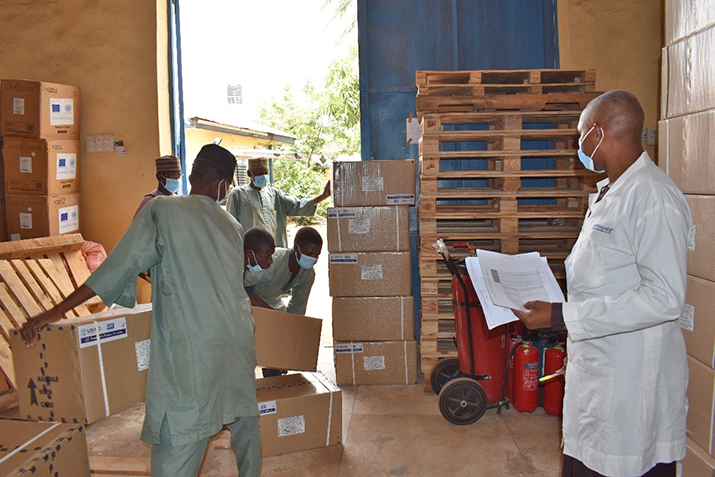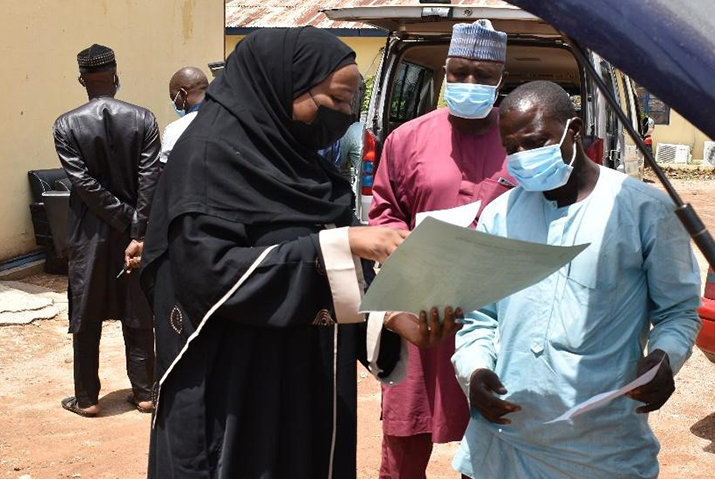Victory Against Mosquitoes in Nigerian Communities, One Child at a Time
Victory Against Mosquitoes in Nigerian Communities, One Child at a Time
![[Trained community drug distributors administer preventative treatment for malaria to children under five living in a camp for internally displaced persons in Zamfara State, Nigeria.] {Photo credit: Dr. Sherifah Ibrahim/MSH}](https://msh.org/wp-content/uploads/2021/09/pmis_smc_715px_0.png)

Anka, a rural community in northern Nigeria, is home to people displaced by violence and conflict in the state of Zamfara. A nutrition crisis looms large and the rain was a welcome relief this year, as displaced persons and villagers were able to produce their food. However, this respite is dampened by the swarms of mosquitoes that breed in water ponds and farmlands and bring malaria—an unwelcome prospect for all, especially for children under 5 who are already undernourished. Although malaria is endemic throughout Nigeria, there are areas mainly in the northern parts of the country, like Zamfara, where malaria transmission peaks during the rainy season of June–October.
This year, a group of community volunteers, supported by the state government in partnership with the U.S. President’s Malaria Initiative for States (PMI-S) project led by MSH, is determined to ensure that the rains bring food and nourishment but not malaria. To accomplish this, the state and its hundreds of volunteers are committed to delivering preventive treatment to children through a Seasonal Malaria Chemoprevention (SMC) campaign in Anka and 13 other local government areas (LGAs) in the state. Children between 3 and 59 months should receive four to five monthly courses of sulphadoxine-pyrimethamine and amodiaquine (SPAQ), an antimalarial medicine, administered in cycles throughout the rainy season to be fully protected.
According to Dr. Sanusi Bello, the program manager of the Zamfara State Malaria Elimination Program (SMEP), “We are determined to address this situation in the state where the rainy season brings about this mixed fortune of the prospect of a bumper harvest that is clouded by the fear of malaria, especially for children who easily fall sick and often die from malaria.” The campaign has reached more than one million children in Zamfara with lifesaving medicines this season, staving off the prospect of thousands of illnesses related to malaria.
A collective effort to reach the last mile
Recognizing that it takes a village to eradicate malaria, the PMI-S project advocated the Zamfara State Government and secured funds to support last-mile delivery of SPAQ and other commodities for the campaign. This is the first time the state government has supported last-mile delivery of SPAQ since implementing partners started supporting Zamfara in the fight against malaria. Local funding enabled the transport of SMC medicine from regional centers to nearly 600 health facilities that served as distribution hubs across Zamfara. State funds also help ensure COVID-19 precautions through the provision of 10,000 reusable facemasks and hand sanitizer. The local government organized community mobilization activities through town announcements and advanced infrastructural improvements of warehouses for the adequate storage and management of medicines and supplies.
Community volunteers step in
The project also helped the Zamfara SMEP build the needed skills to deliver the SMC through a series of trainings cascaded down to 559 health facilities across the state’s 14 LGAs.
The health facility workers trained by the SMEP trained 4,898 community drug distributors (CDDs) who were tasked with carrying out last-mile delivery of medicines to the health facilities. “The work of the CDDs was made easy by the community sensitization that took place prior to the campaign, the advocacy visits carried out to opinion leaders and malaria stakeholders in the state, in addition to the broadcast of radio jingles and messages to encourage the people to bring their children out to receive the medications,” said Dr. Bello. The Zamfara SMEP was also supported by the project to conduct field monitoring and supervisory visits to ensure good quality service delivery during the campaign.
A successful campaign

According to Dr. Bello, “The campaign this year in Zamfara was targeted at reaching 1,273,400 eligible children through trained CDDs across the 14 local government areas and 147 wards in the state. It is noteworthy that the campaign has thus far had 99% coverage in the first cycle as the CDDs administered SPAQ to 1,257,482 children.”
To prepare for the second cycle, the project and government stakeholders, including the Primary Health Care Departments of the 14 LGAs, Health Service Management Board, Ministry of Women Affairs, Ministry of Information, Ministry of Local Government and Chieftaincy Affairs, Emirate Councils, and Zamfara State Primary Healthcare Development Agency, carried out review meetings where challenges, lessons learned, and recommendations for subsequent SMC cycles were discussed.
PMI-S remains committed to implementing malaria prevention and control interventions to save vulnerable populations such as pregnant women and children under 5 in unreached and underserved communities where mosquitoes that cause malaria abound.